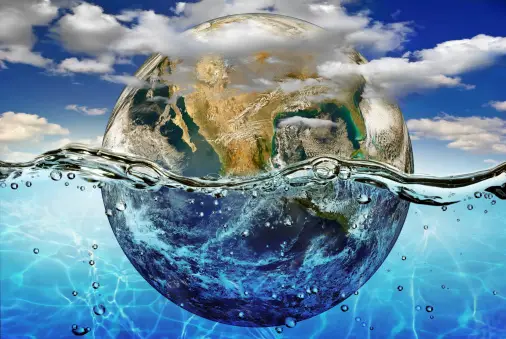Effects of Ocean Warming on Marine Ecosystems In 2023

Effects of Ocean Warming on Marine Ecosystems In 2023? Ocean warming is a critical issue that has gained significant attention in recent years. As our planet experiences climate change, rising temperatures in the ocean have far-reaching consequences for marine ecosystems. In 2023, the effects of ocean warming have become more pronounced and continue to pose significant challenges for the delicate balance of life in our oceans.
Introduction
The Earth’s oceans play a vital role in regulating global climate patterns and supporting diverse ecosystems. However, the rapid increase in greenhouse gas emissions has led to rising temperatures, causing ocean warming. This phenomenon has profound effects on marine life, leading to widespread ecological disruptions.
The Science Behind Ocean Warming

Ocean warming is primarily driven by the absorption of excess heat trapped by greenhouse gases in the atmosphere. As the oceans absorb more heat, the temperature rises, impacting marine organisms that are highly sensitive to changes in their environment. The warming is not uniform, and some regions experience more significant increases than others.
Coral Reefs: A Fragile Paradise Under Threat
Coral reefs are among the most diverse and productive ecosystems on Earth. However, they are highly vulnerable to even small temperature changes. Ocean warming triggers coral bleaching, a phenomenon where corals expel the symbiotic algae that provide them with essential nutrients and vibrant colors. Prolonged bleaching events can lead to the death of entire reef systems, causing irreparable damage to marine biodiversity.
Impact on Fish and Marine Mammals

Ocean warming affects the distribution and abundance of fish species, as they migrate in search of suitable temperature ranges. This can disrupt ecosystems and impact fisheries, affecting food security for millions of people worldwide. Marine mammals, such as whales and seals, also face challenges as their prey species shift or decline due to changes in ocean temperature and availability of food.
Altered Ocean Currents and Ecosystem Dynamics
Ocean warming influences the strength and direction of ocean currents, which are crucial for nutrient transport and the dispersal of larvae and other organisms. Changes in these currents can disrupt the connectivity between ecosystems and impact the productivity and functioning of marine food webs. This, in turn, can lead to cascading effects throughout the entire ecosystem.
Disruption of Food Webs and Biodiversity Loss
Ocean warming has the potential to disrupt the delicate balance of marine food webs. Species that rely on specific temperature ranges for reproduction and survival may struggle to adapt, leading to population declines or local extinctions. The loss of key species can have ripple effects throughout the ecosystem, affecting predator-prey relationships and overall biodiversity.
Acidification and its Consequences

As the oceans absorb more carbon dioxide from the atmosphere, they become more acidic. This process, known as ocean acidification, poses a significant threat to marine life, particularly organisms with calcium carbonate structures like shells and coral skeletons. Acidic conditions make it harder for these organisms to build and maintain their protective structures, putting them at risk.
Read More: Computer Scanners: A Closer Look In 2023
Coastal Communities and Economic Implications
Ocean warming has direct impacts on coastal communities that rely on healthy marine ecosystems for their livelihoods. Fishing industries may suffer from declining fish stocks, while coastal infrastructure faces increased risks from storms and rising sea levels. Tourism, another crucial economic sector in many coastal regions, can also be affected by the loss of iconic marine habitats like coral reefs.
Mitigation Strategies and Conservation Efforts
Addressing ocean warming requires global cooperation and the implementation of effective mitigation strategies. Reducing greenhouse gas emissions is crucial to limit further temperature increases. Additionally, protecting and restoring marine habitats, such as coral reefs and seagrass beds, can help enhance the resilience of ecosystems and support the recovery of vulnerable species.
The Role of International Cooperation

International collaboration is essential in tackling the challenges posed by ocean warming. Countries must work together to establish policies and agreements that prioritize the conservation and sustainable use of marine resources. This includes implementing measures to reduce pollution, improve fisheries management, and create marine protected areas.
Innovations in Technology and Research
Technological advancements play a crucial role in understanding and mitigating the effects of ocean warming. Remote sensing, underwater robotics, and advanced monitoring systems provide valuable data for scientists and policymakers. Furthermore, continued research and innovation are necessary to develop new technologies and approaches to adapt to a changing ocean environment.
Adapting to a Changing Environment
As ocean warming continues, adaptation becomes essential for both marine organisms and human communities. It involves understanding the vulnerabilities and resilience of ecosystems, implementing adaptive management strategies, and supporting communities in transitioning to sustainable practices. By embracing resilience and innovation, we can navigate the challenges posed by ocean warming and protect the health and integrity of our oceans for future generations.
Conclusion
Ocean warming is a pressing issue that demands immediate attention. Its impact on marine ecosystems is far-reaching, affecting everything from coral reefs to fish populations and coastal communities. By recognizing the significance of ocean warming and taking collective action, we can safeguard the health and vitality of our oceans and ensure a sustainable future for all.











